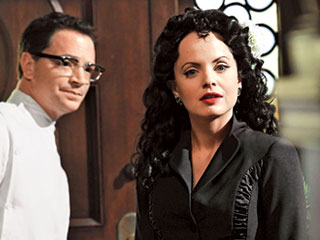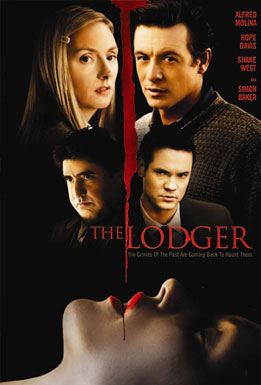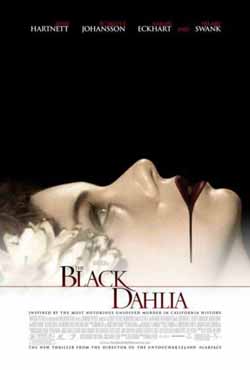ISHAM TALKS 'BLACK DAHLIA' SCORE
SAYS FILM WAS 'PRETTY MUCH' EDITED DOWN TO FINAL VERSION PRIOR TO ADDING SCORE Mark Isham
Mark Isham had a very interesting conversation with
Broadway World's Pat Cerasaro, in which the composer discussed, among other projects, his work on
Brian De Palma's
The Black Dahlia. While there was a version of
The Black Dahlia screened for test audiences in early 2006 that was longer than the final released film, Isham seems pretty certain there was no overt studio involvement that specifically led to the shorter version. Instead, he speculates that producer
Art Linson may have simply discussed with De Palma trimming the almost three-hour cut down to two hours. Isham also relates how he initially mis-guessed what kind of music De Palma would want for
The Black Dahlia. Here is the section of the interview pertaining to that film:
PC: What was it like working with Brian De Palma on THE BLACK DAHLIA? Was it cumbersome to come in already knowing his amazing legacy of great scores for his films - particularly those by Pino Donaggio and Ennio Morricone? His film’s scores are always so specific. MI: Well, he was a gentlemen about it, too. I think that I had sent him some music early on for that and he didn’t respond to it, and, so, I called the producer and I said, “Look, I would really love to do this movie. What is he looking for?” And the producer sent me over some pieces they were using for the temp-score and I realized that I had completely mis-guessed on how he wanted to score this thing.
PC: Oh, really?
MI: Yeah, so I re-sent him some music and he called me immediately and said, “This is what I am looking for!” So, I think we started off right on the right foot because, once I knew what he was looking for, I duplicated it and presented it to him immediately and he said, “That’s perfect.” So, we went in with a high degree of mutual respect and delight and willingness in doing this together. He was just great. Like you say, he is very specific and when he says, “That’s good,” then, you know you are doing great. [Laughs.]
PC: And if you are not?
MI: “Don’t do that! That’s terrible!” - then you know you have to rewrite it. [Laughs.]
PC: That film was plagued with behind-the-scenes shenanigans and I know there was originally a much, much longer original cut, so how did you deal with that? Did you score that version or only the version that eventually was released? Have you ever gone to an opening night and half your score was missing?
MI: [Laughs.] Actually, I have - but, not on that picture! From the time that we started scoring it, it was pretty much as it came out. I believe that the studio actually stayed out of that and I think what a lot of it was about was that he was working with Art Linson - who produced THE UNTOUCHABLES and they have a long, long history - and, I think Art is one of the few who can say, “Brian, you can’t have a 3-hour movie,” [Laughs.] and Brian will actually respect that.
PC: How interesting.
MI: I think they had already gone through the process of editing it down. Art actually came to me at one point and said, “Look, there are still a couple of things that I think Brian needs to change - but, I think Brian and I have sort of had as much of a discussion as we are going to have, so why don’t you see what you can do to help these areas?” And, then, I think there were a few picture-trims at that point - but, pretty much, I worked on it when it was the final film and not much changed.
PC: There are some thrilling music cues - especially the opening scene with Josh Hartnett and, later, the Fiona Shaw mad scene.
MI: Yeah. Yeah. Yeah.
PC: Were you influenced by Jerry Goldsmith’s CHINATOWN score?
MI: Oh, yes - of course. I love that score and know it very well.
PANKOW HAD TO TRIM LESBIAN FLOOR SHOW FROM FIVE MINUTES DOWN TO JUST ONE MINUTE
Editor Bill Pankow has described how he had to edit down the k.d. lang song and floor show in the lesbian night club from five minutes to one minute, so it does seem there was at least the potential for some trimming even after Isham had completed his score. Pankow showed the uncut version of the scene to a master class in 2007, describing how he managed to get it down to one minute. Perhaps one day, we will get a cut of the film that is a bit longer...
 This week's episode of FX's American Horror Story, which aired last night, features Mena Suvari as "the Black Dahlia," aka Elizabeth Short. The episode is the second so far this season that was written by Jennifer Salt (also an executive producer on the show), and it ends with a bang: an unforgettable line of dialogue that seems to nastily set up the final leg of the season.
This week's episode of FX's American Horror Story, which aired last night, features Mena Suvari as "the Black Dahlia," aka Elizabeth Short. The episode is the second so far this season that was written by Jennifer Salt (also an executive producer on the show), and it ends with a bang: an unforgettable line of dialogue that seems to nastily set up the final leg of the season.




 Mark Isham had a very interesting conversation with
Mark Isham had a very interesting conversation with  If you've been looking to complete your collection of music from Brian De Palma's cinematically sumptuous adaptation of James Ellroy's The Black Dahlia, your task just got a little easier. Yesterday, k.d. lang released Recollection, a two-CD set that includes, finally, her version of Cole Porter's Love For Sale as performed in The Black Dahlia. Meanwhile, yesterday, I learned something I hadn't realized: the music on the soundtrack during the Man Who Laughs sequence (where the three friends are watching the silent movie at the theater) was done by Mark Isham's assistant,
If you've been looking to complete your collection of music from Brian De Palma's cinematically sumptuous adaptation of James Ellroy's The Black Dahlia, your task just got a little easier. Yesterday, k.d. lang released Recollection, a two-CD set that includes, finally, her version of Cole Porter's Love For Sale as performed in The Black Dahlia. Meanwhile, yesterday, I learned something I hadn't realized: the music on the soundtrack during the Man Who Laughs sequence (where the three friends are watching the silent movie at the theater) was done by Mark Isham's assistant,  Space Ace sent in this poster image for The Lodger a few weeks ago, noting the obvious similarities with the poster for The Black Dahlia. In the November 28 issue of
Space Ace sent in this poster image for The Lodger a few weeks ago, noting the obvious similarities with the poster for The Black Dahlia. In the November 28 issue of 

 Michael Guillen has riffed off a nice summary of the links between The Man Who Laughs, The Dark Knight, and The Black Dahlia in a two-part piece stemming from a recent screening of The Man Who Laughs at the
Michael Guillen has riffed off a nice summary of the links between The Man Who Laughs, The Dark Knight, and The Black Dahlia in a two-part piece stemming from a recent screening of The Man Who Laughs at the  By the way, we can add Keith Uhlich to the list of Dark Knight critics getting tons of hate mail for disliking the film. Uhlich does, however, make a De Palma reference in his review of the film at
By the way, we can add Keith Uhlich to the list of Dark Knight critics getting tons of hate mail for disliking the film. Uhlich does, however, make a De Palma reference in his review of the film at  Some early raves have cited The Dark Knight as the film that lifts director Christopher Nolan into the big leagues of the crime film genre. Writing at
Some early raves have cited The Dark Knight as the film that lifts director Christopher Nolan into the big leagues of the crime film genre. Writing at  But while some critics this week have been less enthusiastic (with most of the latter citing a lack of spatial clarity and quick-cut editing as part of the film's problems), Armond White has set himself apart as the man who refuses to laugh in the face of this somber Batman. White's review of The Dark Knight in this week's
But while some critics this week have been less enthusiastic (with most of the latter citing a lack of spatial clarity and quick-cut editing as part of the film's problems), Armond White has set himself apart as the man who refuses to laugh in the face of this somber Batman. White's review of The Dark Knight in this week's  For Nolan, making Batman somber is the same as making it serious... As in Memento, Nolan shows rudimentary craft; his zeitgeist filmmaking—morose, obsessive, fussily executed yet emotionally unsatisfying—will only impress anyone who hasn’t seen De Palma’s genuinely, politically serious crime-fighter movie, The Black Dahlia. Aaron Eckhart’s cop role in The Black Dahlia humanized the complexity of crime and morality. But as Harvey Dent, sorrow transforms him into the vengeful Two-Face, another Armageddon freak in Nolan’s sideshow.
For Nolan, making Batman somber is the same as making it serious... As in Memento, Nolan shows rudimentary craft; his zeitgeist filmmaking—morose, obsessive, fussily executed yet emotionally unsatisfying—will only impress anyone who hasn’t seen De Palma’s genuinely, politically serious crime-fighter movie, The Black Dahlia. Aaron Eckhart’s cop role in The Black Dahlia humanized the complexity of crime and morality. But as Harvey Dent, sorrow transforms him into the vengeful Two-Face, another Armageddon freak in Nolan’s sideshow.